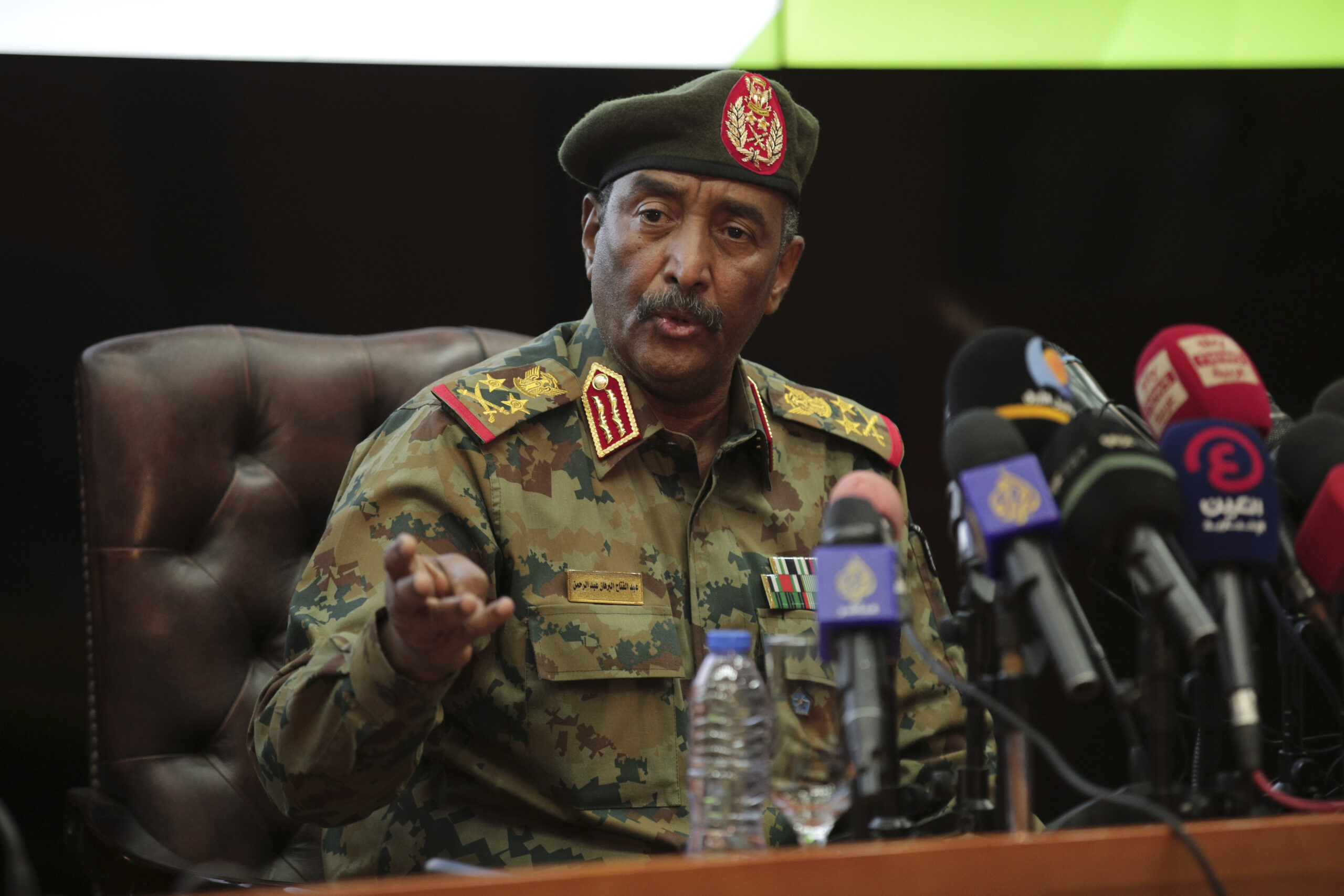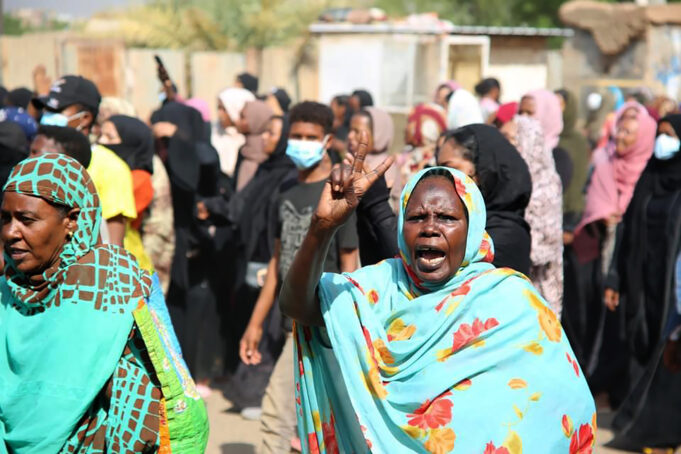Thousands took to the streets of Khartoum recently in response to Sudan’s latest military coup.

“We reject the statement (made by General Abdel Fattah al-Burhan) and we will not negotiate any more with the military,” said an unnamed protester from the streets, reported dw.com.
“They detained the (cabinet) ministers, they detained members of the Sovereign Council. This is a full fledged coup and we reject it completely,” added another unnamed demonstrator.
The apparent coup came a day after U.S. Special Envoy for the Horn of Africa Jeffrey Feltman concluded two days of meetings in Sudan to underscore U.S. support for Sudanese proposed democracy. According to envoy Feltman, after flying out of Khartoum, he felt “mildly encouraged by its talks with Sudanese military and civilian leaders,” reported NPR.
Feltman, who said he learned about the Oct. 25 coup on his phone after landing in Doha, Qatar, the day the transitional government was sacked, also told NPR, “If the transition is essentially a patient that has an illness, you find the therapy that addresses the illness. You don’t use medicine to kill the patient, which is what the military seem to be trying to do.”
The meetings leading up to the military coup included Sudan’s acting Prime Minister Abdalla Hamdok “seeking debt relief from the U.S.-dominated International Monetary Fund (and World Bank), whose political price was an agreement to hand over (former leader Omar al-Bashir) to the International Criminal Court for war crimes and genocide in Darfur, investigate the role of other senior officials and sign up to the normalization of relations with Israel, as part of a broader anti-Iran alliance.

The IMF’s (and World Bank) economic price included the ending of fuel subsidies, doubling prices at the pumps, abandoning Sudan’s fixed exchange rate and moving to a floating currency, stoking inflation now running at more than 400 percent, up from 144 percent a year ago,” reported wsws.org.
But these demands for privatization of 600 state firms, many controlled by the military and intelligence apparatus, actually according to wsws.org and a columnist at Sudan’s Al-Tayar daily newspaper, Dr. Elnour Hamad, strike at the heart of the military’s financial interests. “It is the fear of these measures that would strip the generals of their access to state funding and practical immunity from prosecution for war crimes that led them to oppose the Hamdok government.”
During an interview with Africa Watch, Dr. Hamad added, “The military members of the Sovereign Council and Rapid Support Forces, (General Abdel Fattah al-Burhan and General Mohamed Hamdan Dagalo also known as Hemedti) own commercial companies that work in import and export without being subject to government’s supervision or auditing. They both run these huge companies in a virtually independent parallel state.”
There is more.
According to the Associated Press: Gen. Burhan has been backed in recent years by Egypt, led by Abdel Fattah Al-Sissi, a general turned autocrat masquerading as president, and Gulf countries, particularly the United Arab Emirates. He trained in Egypt’s military college, with Al-Sissi, as classmate, and has made multiple visits since 2019 to the Emirates’ de-facto ruler, Abu Dubai crown prince Sheikh Mohammed bin Zayed Al-Nahyan.
It appears that Burhan and Hemedti both want to model their military government after Al-Sissi’s, Egypt, whose military controls the North African country’s economy. Not mentioned is the region’s principal player Saudi Arabia, which utilizes for a hefty price Hemedti’s Rapid Support Forces in Saudi’s war effort in Yemen.
Hemedti’s RSF militia was established by al-Bashir in 2013 to fight armed rebel groups in the country’s war-torn Darfur region. Its blood-stained existence, according to TRT-World, has increased fears in Sudan’s pro-democracy circles that “the country might enter another difficult phase in its complicated history.”
“The participation and deployment of the RSF—a force with a well-documented record of abuse including during its deployment in law enforcement operations—is alarming,” said Mohamed Osman, a Human Rights Watch researcher on Sudan.
“We’ve documented how they led a violent dispersal of a sit-in June 2019, and more recently also killed protesters in eastern Sudan. They’ve also arbitrarily detained civilians,” Osman told TRT World. The RSF’s June crackdown reportedly left at least 120 people dead, injuring scores of others. Osman thinks that military leaders want “to send a clear message that abusive operations will be punished” in the face of the coup.
“But it’s not clear,” he said, “how much coup leaders really want to control groups like the RSF, who appear to have already killed 14 protesters, with over 100 injured, with ties to both intelligence and military apparatuses as the security situation in Sudan deteriorates with expanding protests in the country, where the economic crisis has also gotten worse under the pandemic.
“There’s a general preference for a strong military leader who is very transactional. That fits Gulf interests more than a democratic government,” said Cameron Hudson, a former U.S. State Department official and Sudan expert at the Atlantic Council’s Africa Center. “They’re fearful of what an Arab Spring success story (might encourage),” he said, referring to the uprisings in 2011 that helped inspire the Sudanese protests.
But with the halt from the U.S. of $700 million in emergency aid, and the World Bank’s decision to pause its declaration in March of $2 billion in financing, it’s anyone’s guess how long Hamdan and Hermedti can maintain control.
Roughly 20 minutes after Burhan, during a press conference, told his audience, which was broadcast live on Al Jazeera, that the internet would be restored, I received a call from my wife, activist and Sudan’s Call of Future Campaign executive Zakia Siddiq.
For nearly a half hour, with passion in her voice, she said, among other things, Hamdan and Hermedti “are wanting to take complete control of the country.” She added, Egypt, Saudi Arabia and UAE were their major influencers.
“This is what the Sudanese streets reject. This is the reason the protest marchers are in the street and in the coming days it will reveal what will happen,” she said.
Follow @jehronMuhammad on Twitter and see page 13 for related coverage in this edition.













